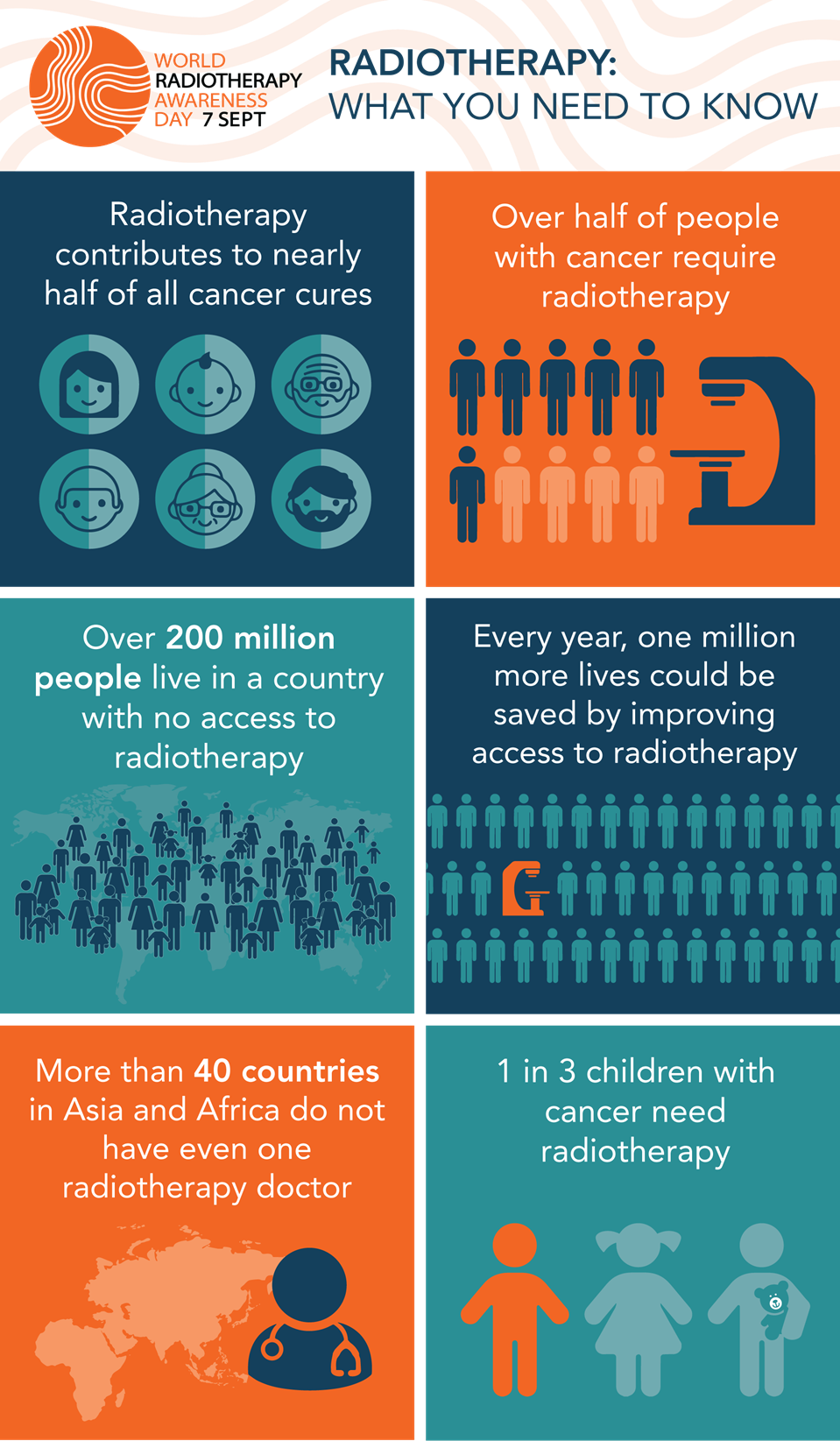One voice for radiotherapy – a new global initiative
Radiotherapy is a vital cancer treatment – yet millions of people around the world still don’t have access to it. To change this, Dr Katie Wakeham, head and neck clinical oncologist at our Trust, has co-founded a new global initiative: World Radiotherapy Awareness Day (WRAD). Here, Katie tells us about the inspiration behind the day and how everyone can get involved on 7 September 2025.
Tell us about your role as a head and neck clinical oncologist.
My experience working with radiotherapy teams in the UK and Uganda, alongside colleagues who shared a strong commitment to improving patients' health and well-being, inspired me to train as a clinical oncologist. I was interested in the diverse opportunities within the specialty, which range from holistic patient care to contributing to advancements in treatment technology both in the UK and overseas.
What does a typical day look like for you?
My specialty is treating head and neck cancers with radiotherapy. I meet with new patients for consultations to discuss diagnoses, treatment options, and answer questions. It's important that this patient group are supported by dieticians and speech and language experts, and we often have joint consultations. I also attend multi-disciplinary meetings with other specialists (surgeons, radiologists, pathologists, oral surgeons) to discuss cases and create a comprehensive treatment plan. Head and neck radiotherapy planning is complex, and I collaborate with radiation therapists and medical physicists to ensure accurate treatment delivery. Every day is different!
You’re the co-founder of a new, global awareness day: World Radiotherapy Awareness Day. How did the idea for this global initiative first come about?
Radiotherapy is an essential cancer treatment and part of the cure in about half of adults and a third of children diagnosed with cancer. It is also one of the most cost-efficient cancer treatments available, but despite this, millions of patients worldwide still lack access due to systemic, geographic and economic barriers. And radiotherapy has long been overlooked as a treatment option in comparison to chemotherapy and surgery.
This neglect has contributed to a widening “treatment gap,” causing millions of patients to miss out on the benefits that radiotherapy can provide. Now is the time for us to address this disparity and advocate for the recognition and integration of radiotherapy as a critical component of cancer treatment.
The WRAD initiative was first introduced during London Global Cancer Week in November 2024 and has since gained widespread support. A global planning meeting in March 2025 drew over 800 participants from around the world, including representatives from major radiotherapy societies as well as patient advocates and industry sponsors.
Dr Katie Wakeham"Globally, 200 million people live in a country with no access to radiotherapy – and more than 40 countries in Asia and Africa do not even have one trained radiation oncologist."
The first WRAD will take place on September 7, 2025 – why was that date chosen?
The date, September 7, commemorates the first patient ever treated on a linear accelerator at Hammersmith Hospital in 1953. This innovation revolutionised cancer treatment and is therefore an important date for radiotherapy and for the history of Imperial College Healthcare NHS Trust.
The theme for the inaugural awareness day is “One Voice for Radiotherapy”. Tell us about this.
WRAD is our opportunity to speak with one voice – to raise awareness, educate the public, and advocate for equitable access to radiotherapy for all who need it.
“One Voice for Radiotherapy” captures the fact that WRAD is truly a global movement, where the whole radiotherapy community has joined forces to help people living with cancer, no matter where they live. We have translated our graphics and media toolkit into other languages to reflect this and to make the campaign accessible to all.
Dr Katie Wakeham"The date, September 7, commemorates the first patient ever treated on a linear accelerator at Hammersmith Hospital in 1953. This innovation revolutionised cancer treatment and is therefore an important date for radiotherapy and for the history of Imperial College Healthcare NHS Trust."
How do you hope WRAD will help close current gaps in access and awareness?
Over half of people with cancer require radiotherapy as part of their treatment. Nationally, there is a marked variation around the UK, and we are not reaching the target of 50 per cent of cancer patients receiving radiotherapy, which may mean people are missing out on this essential treatment. Globally, 200 million people live in a country with no access to radiotherapy – and more than 40 countries in Asia and Africa do not even have one trained radiation oncologist.
The primary goals of WRAD are to raise awareness about the significance of radiotherapy in cancer treatment and to highlight the urgent need to improve access to it. We seek to educate healthcare professionals, patients, and policymakers about the importance of radiotherapy, while also recognising the contributions of radiotherapy professionals and stressing the necessity for a skilled and adequately sized workforce.
I firmly believe that a recognised day will unite the community and amplify our efforts to confront these challenges on a global scale.
What kinds of events and activities will be taking place on WRAD?
WRAD is not a one-time initiative; it serves as a platform to ignite a lasting movement that can transform the perception, funding, and prioritisation of radiotherapy. I am asking people to support this vital initiative and get involved by:
- Following WRAD on social media to stay updated on our efforts. We are active on LinkedIn, Facebook, Instagram, X and YouTube.
- Reposting and sharing messages about “One Voice for Radiotherapy” on your social media channels.
- Signing up for the WRAD newsletter on our website to receive the latest news and updates.
- Organising a WRAD event with your team using the resources available on the WRAD website, to celebrate the launch of this movement. Please also send WRAD photos and testimonials to contact@worldradiotherapy.org.

